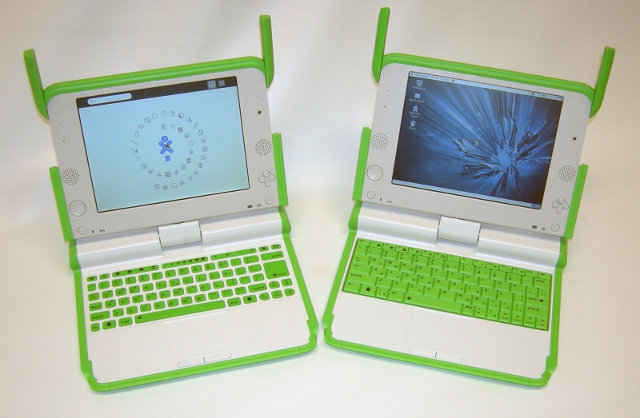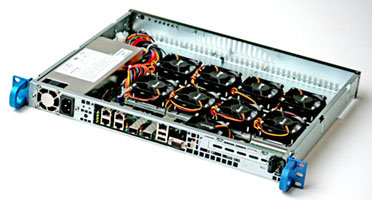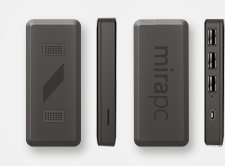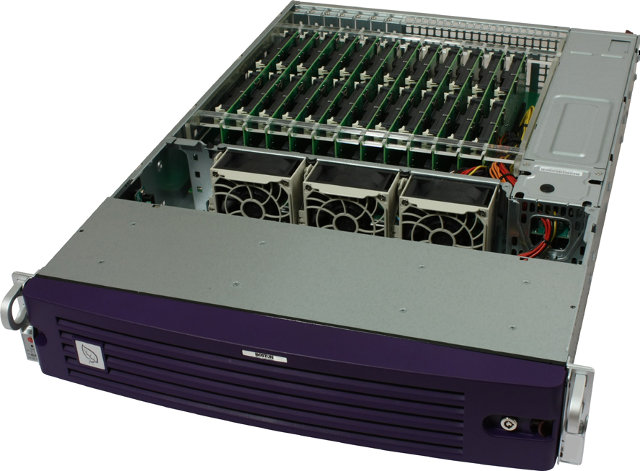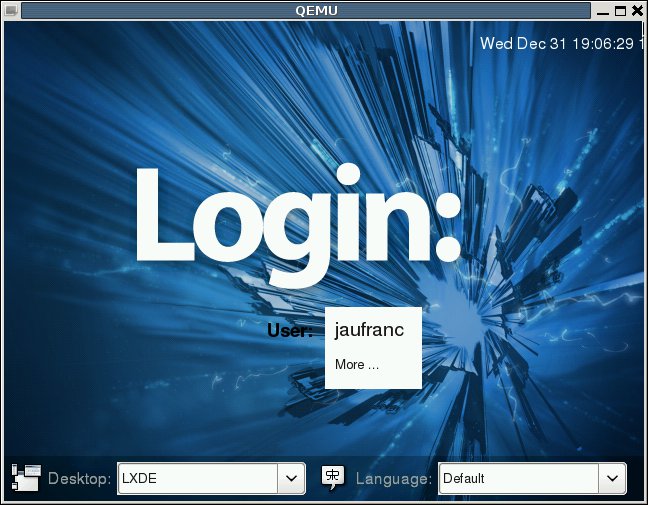Last year, OLPC (One Laptop Per Child) announced their first laptop powered by ARM, with OLPC X-1.75 powered by Marvell ARMADA 610 single core processor (And sold over 100,000 since Q1 2012). The 2 new models – OLPC XO-4 and OLPC XO-4 Touch – will be upgraded to ARMADA PXA2128 triple core processor (2 ARMv7 Core + 1 Hybrid LPM (Low Power Mode) ARMv7 core), which the OLPC XO-4 Touch offering multitouch support. OLPC XO-4 laptop will look exactly like the OLPC 1.75 laptop pictured below. OLPC XO-4 will have the following specifications: SoC – Marvell PXA2128 (ARMv7 compatible) @ 1 GHz with Vivante GC2000 GPU System memory – 1GB or 2GB DDR3 RAM (Depending on configuration) Mass storage: 4 GB or 8GB NAND flash (eMMC) Internal microSD card slot for repair/replacement Externally accessible SD card slot; Display – 7.5” dual-mode TFT display with touchscreen (2 simultaneous touch max) Audio […]
Codethink Launches The Baserock Slab ARM Server
Codethink has just announced an ARM based server called “The BaseRock Slab” powered by Marvell ARMADA XP quad core ARMv7-A processors with 2 GB RAM and 30GB (up to 120GB) mSATA SSD Storage per node, which targets applications such as cloud computing infrastructure and native ARM build and test. This 32 cores server comes in a 1U chassis (483mm x 44mm x 355m), is powered by a 260 PSU, integrates eight Cogent CSB1726-ArmadaXP SoM (Marvell Armada XP quad-core ARMv7-A CPUs, 1.33Ghz + 2 GB ECC DDR3 RAM) in to a carrier board featuring the following: 30GB (max 120GB) mSATA SSD, max 250MB/sec read/write, per SoM SATA port for additional dedicated storage, per SoM Dual 2.5Gbit/s full-duplex ethernet, trunkable into a single 5Gbit/s link Management SoM for remote power, fan and reset control Firmware upgrade via the network The server is managed by Cogent CSB1724 SoM powered by Marvell Armada 300 […]
Fedora To Give Away Raspberry Pis, OLPC 1.75 Laptops and Arduinos to Developers
Fedora will give away over 200 open hardware devices as part of its Summer of Hardware initiative to Fedora contributors. 150 Raspberry Pi boards, 50 OLPC 1.75 laptops and 20 Arduino boards and shields will be freely distributed to randomly selected candidates. In order to qualify, you must have a Fedora Project account, have signed the Fedora Project Contributor Agreement, be a member of at least one non-CLA / FPCA Fedora Group and be resident in one of the following country/region: Australia (excluding the states of New South Wales and the Australian Capital Territory), Belgium, Canada (excluding Quebec), Germany, India, Japan, the Netherlands, New Zealand, Singapore, South Korea, Spain, Sweden, United Kingdom, or the United States (excluding New York and Florida). To apply, you need to fill an application form by the 15th of August where you select your preferred device and enter your full name, Fedora account information and […]
Stella Mira Pocket Console AllWinner A10 mini PC with Built-in Bluetooth and Up to 128 GB Flash
Stella Mira, a new technology startup, has come up with a new Android mini-PC based on AllWinner A10 (how original!) called the Pocket Console (aka MiraPC). What makes it stand apart is that it comes with built-in Bluetooth, has several versions based on the NAND flash size: 8GB, 16GB, 32GB, 64 GB and even 128 GB, and the company plans to release a 3G version in September. The company also provides a dock, the Stella Mira Pocket Dock, that comes pre-loaded with one of supported Linux distributions, without the requiring the knowledge and time to configure microSD card for Linux. The company will provide 4 Linux distributions: Ubuntu 12.04 (Custom build – Ready) Lubuntu 12.04 (Custom build – Ready) Xubuntu 12.04 (Custom build – Final stage of development) Fedora 17 XFCE (Not officially supported, but backed by a large development community) Beside running Linux, the Pocket Console can also “run […]
Boston Ships Viridis ARM Server Based on Calxeda EnergyCore Cortex A9 SoC
At the end of 2011, Boston, a British IT company, announced plans for an ARM server based on Calxeda Quad Core Cortex A9 Server-on-Chip, and now the company recently announced they started to ship the server (called Viridis) to their first customers. We now have further details about the server including the key features: Ten times the performance at the same power in the same space Cut energy and space by 90% Easily scalable to thousands of nodes 48 SoC devices delivered across 12 Calxeda EnergyCard modules Each EnergyCore SoC contains an ARM quadcore processing unit, providing a total of 192 cores per 2U enclosure Low power consumption: <300W with each SoC consuming between 0.5 to 5W depending on the load. Up to 24 SATA HDDs or SSD devices Up to 192GB of RAM per 2U enclosure A Calxeda EnergyCard (pictured below) features 4 Calxeda EnergyCore ECX-1000 SoC which can […]
Collabora and Fluendo Release GStreamer SDK 2012.5 Amazon
Last week, Collabora and Fluendo jointly announced the release of an open source software development kit (SDK ) for GStreamer multimedia framework. The SDK aims at easing the integration of Gstreamer into projects and provides a pre-built version of the framework which is available for Linux, Windows and Mac OS X. GStreamer is used in many Linux applications such as media players (Rhythmbox, Banshee and Amarok), video editors (PitiVi), and media centers such as XBMC among other applications. It’s also often the framework used to play videos on ARM platforms with implementations for OMAP 4/5 and devices compliant with the OpenMAX standard. Gstreamer website has also been updated and provides links to download GStreamer SDK and documentation on the home page. The new documentation looks pretty good with fives main sections: Instructions for installing the SDK on Linux (Ubuntu, Debian and Fedora), Windows or Mac OS. 11 basic and 2 advanced tutorials. […]
How To Let Sudo Insult You When You Type the Wrong Password
This is a completely useless post, but it’s possible to configure sudo to return insults instead of the default error message when you type the wrong password. To enable this feature, edit /etc/sudoers (with visudo for example) and change the line:
|
1 |
Defaults env_reset |
to :
|
1 |
Defaults env_reset,insults |
Open a terminal windows as a normal user, type a command with sudo and input the wrong password. Here are a few examples: $ sudo bash [sudo] password for testman: xxx Are you on drugs? [sudo] password for testman: xxx Maybe if you used more than just two fingers… [sudo] password for testman: xxx Listen, burrito brains, I don’t have time to listen to this trash. [sudo] password for testman: xxx You silly, twisted boy you. [sudo] password for testman: xxx What, what, what, what, what, what, what, what, what, what? [sudo] password for testman: xxx You do that again and see what happens… [sudo] […]
Instructions to Run Raspberry Pi Fedora 14 Remix in QEMU
As mentioned in my previous post, the Raspberry Pi Foundation has just released the Fedora 14 Remix SD card image that can be installed either via installer (easiest method) or using dd / windd as with the previous image. In this blog post, I’ll give the instructions how to run Raspberry Pi Fedora 14 Remix in QEMU using a similar method than the one I used for Debian Squeeze. I tested since in machines with Ubuntu 10.04 LTS and Debian 6.0.4. Download the image using BitTorrent raspberrypi-fedora-remix-14-r1.img.gz.torrent or via the HTTP link available on Raspberry Pi Download page. Decompress the image:
|
1 |
gzip -d raspberrypi-fedora-remix-14-r1.img.gz |
Download kernel 3.0.4 image for qemu, if you don’t have it yet.
|
1 |
wget http://dl.dropbox.com/u/45842273/zImage |
Since the rootfs is full (in the real board it will be resized to the size of the SD Card), we need to increase the size of the rootfs partition. First create and empty 3G […]


